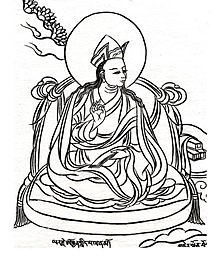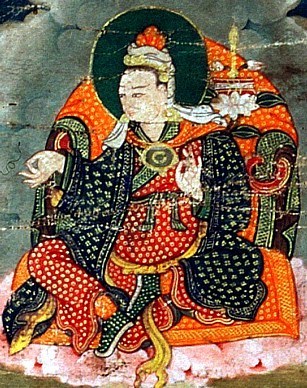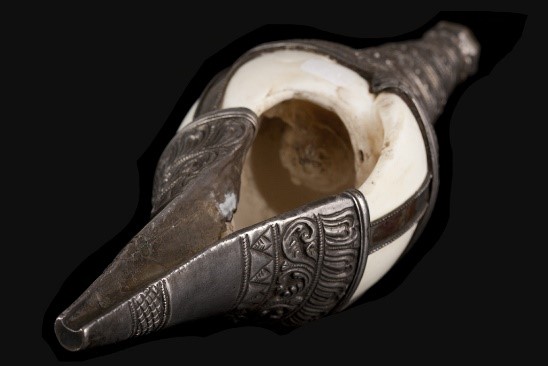Urgyen Lingpa: political and legal sceptic
Urgyen Lingpa (O rgyan gling pa, born c. 1323) is most famous for his revelation of twenty-eight treasure troves, which include the Pema Katang (Padma bka’ thang) and the Five Chronicles (bKa’ thang sde lnga).
About his life, little is known. However, as Matthew Kapstein (2000: 166–67) comments, some of the ‘prophetic’ passages in the Pema Katang amount to a direct commentary on the political situation in the mid-fourteenth century. This lends some credence to the claims of his hagiographers that he was the object of political persecution (eg. Dudjom Rinpoche 2002: 775–79).

Passages ostensibly about the imperial period can, for example, be read as criticism of contemporary laws that were not properly made or applied. It seems that Urgyen Lingpa was quite critical of the Yuan, who then controlled Tibet’s administration.
Chapter 67 of the Pema Katang concerns Tri Song Detsen’s (Khri Srong lde btsan) law-making.[1] It starts with a fairly standard account of how the king establishes the religious and royal laws, like a silken knot and a golden yoke. Other religious histories, such as the twelfth-century Pillar Testament (bKa’ chems ka khol ma) and the rGyal rabs gsal ba’i me long of Lama Dampa (nearly contemporaneous with Urgyen Lingpa), contain similar accounts and emphasize congruence between the royal laws, the ten virtues, and the sixteen moral principles (the mi chos chen mo bcu drug). Urgyen Lingpa, by contrast, follows his account with a quite prosaic discourse on proper behaviour. For example:
- Children should learn how to understand, write, and read.
- Tantric practitioners should attend birth rituals,
- Nurses should give assistance and medical treatment to the sick.
- Do not allow old people to become sad, but treat them with respect.
His tone can be harsh:
- If there is no law in the land (yul khrims), the wicked oppress others.
- Banish them by beating them with sticks (or) fetter them with neck ropes.

The rGyal po bka’ thang also contains critical comments on those who make and administer the law. It starts, for example, by saying that when Tri Song Detsen issued oral decrees, he carefully examined the good and bad, the lesser and greater, and the higher and lower, in great detail, and he formulated them with succinct words and concise meanings [pp. 149–50]. But:
།ལེགས་ཉེས་ཆེ་ཆུང་ལེགས་པར་མ་བརྟགས་ན།
།སེར་གཞིག་ལོང་མེད་བཙན་པོའི་བཀའ་ལུང་ལ།
།ཉེས་མེད་མི་ལ་ཆད་པ་ཕོག་པ་མང་།
།བྱམས་པ་མེད་པའི་རྒྱལ་པོ་སྲིན་པོ་འདྲ།
།སེར་གཞིག་མེད་པའི་རྒྱལ་པོ་རྦབ་དང་འདྲ།
- If the good and bad, the lesser and greater, and the higher and lower [aspects] have not been examined,
- And time is not taken to analyse corruption, then under the oral decrees of the emperor
- Innocent people receive many punishments,
- The king seems like a demon, devoid of kindness.
- The king who does not examine corruption in detail is like an avalanche.
།ལེགས་ཉེས་ཆེ་ཆུང་ལྟ་ལོང་མེད་པ་ནི།
།ཐ་མལ་བྱོལ་སོང་ཡུས་ཀྱིས་བརྣངས་པ་འདྲ།
།མ་བརྟགས་མ་གཞིགས་བཙན་པོའི་བཀའ་ལུང་ནི།
།གཞན་གྱིས་ཁྲེལ་ཞིང་རང་རེ་གྱོད་ཀྱིས་ཟིན། ...
།བློན་པོ་ངན་པས་མི་རྣམས་གྱོད་ལ་སྐྱེལ།
ཁྲིམས་ཀྱི་སྲང་མདའ་ལེགས་པར་བརྟག་པའི་དུས།
།རང་འདོད་བཤད་པས་བདེན་པའི་ཚིག་མི་ཐོས།
- If time is not taken to examine the good and bad, and the greater and lesser,
- Common [people] [become] like beasts of burden, choked by false accusations.
- The unexamined, unanalysed oral edicts of the emperor
- Are despised by others, and disputed by everyone. ...
- Bad ministers generate disputes among the people.
- At a time when the scales of law ought to be properly examined
- Because of self-serving explanations, not one word of truth will be heard.
Although ostensibly about the time of Tri Song Detsen, this passage can easily be interpreted as criticism of the contemporary period, in which laws were not being enacted or followed correctly.
Some of the prophetic comments in chapter 92 of the Pema Katang are also phrased in terms of law [pp. 564–65, ff. 355r–355v]:
ཧོར་དང་ཡོན་མཆོད་ཁྲིམས་གསར་སྦྲེལ་པ་འོང་༔
ནང་གནག་ཕྱི་དཀར་དུང་དཀར་སྙེ་མ་བཞིན༔
བོད་ཀྱི་བསོད་ནམས་མར་མར་བྲི་བའི་དུས༔
- The new laws of the Mongols and of the donor-priest relations (yon mchod) will be bound together.
- They will resemble a conch shell or an ear of grain, black on the inside and white on the outside.
- It will be a time in which merit will diminish in Tibet.

It would be difficult to read this passage as anything other than a direct criticism of the Yuan administration and of those Tibetans, presumably the Sakya (Sa skya) hierarchs and the Pakmodru (Phag mo gru), who supported them.
Although Urgyen Lingpa repeats the idealistic account of the enactment of the kings’ laws during the empire, then, he develops this account into a barely-disguised critique of the contemporary administrative regime. Good laws are capable to bringing peace and happiness, but current administrators were clearly falling far short of the ideal.
References
Kapstein, Matthew. 2000. Tibetan Assimilation of Buddhism. Oxford: University Press.
Dudjom Rinpoche. 2002. The Nyingma School of Tibetan Buddhism, Gyurme Dorje and M. Kapstein (trans.) Boston: Wisdom.
[1] The extracts here can be found in the historical documents section on this website.




